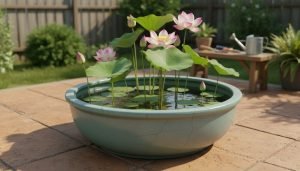Get the week's most popular posts delivered to your inbox.
Our weekly update is free yet priceless and you're less than a minute away from getting the current edition.
In the unlikely event we disappoint, you can unsubscribe with a single click!
Turning your propagation hobby into income looks easy. US law adds hidden hurdles. Each state treats live plants as regulated nursery stock. You may need a license, inspections, and shipping paperwork before a sale leaves the yard. Our guide explains the legal basics so you stay compliant and profitable when selling plants.
Legal Requirements for Backyard and Neighborhood Plant Sales
Contents
Turning a hobby nursery into porch-side commerce presses different legal buttons than interstate shipping. You must meet state licensing rules, satisfy local land-use codes, and respect federal disease controls all at once.
State Licensing Thresholds and Small-Seller Exemptions
Every state regulates live plants as possible pest carriers. California demands a full License to Sell Nursery Stock from anyone who offers rooted plants for sale, even one tray of basil starts.
Colorado sets a revenue trigger instead. You remain exempt until sales exceed $1,000 in any twelve-month period, at which point registration becomes mandatory.
Washington eases entry for hobbyists through a twenty-dollar Plant Sale Permit that covers neighborhood-scale events, and it waives all permits when annual sales fall below one hundred dollars or you sell only cut stems.
Read your agriculture department’s fee tiers and renewal dates before advertising a porch pickup. Filing the correct form up front costs a few dollars and protects you from fines that start at several hundred. Keep the paper copy handy; inspectors visit unannounced when neighbors complain about pests or traffic.
Local Permitting and Home-Occupation Controls
State paperwork never overrides city zoning. Many residential codes label on-site plant sales a “home occupation” and cap visitor numbers, parking, signage size, and greenhouse setbacks.
Prosper, Texas, for instance, lets home enterprises operate only when they remain clearly secondary to living space and generate no off-site impacts such as noise or constant traffic. Your town might require a general business license, sales-tax permit, or conditional-use hearing before customers line up on the driveway.
Homeowners associations layer on aesthetic rules that restrict shade-cloth colors, hoop-house height, and roadside banners. Skipping local approvals can trigger cease-and-desist orders or daily penalties that erase seasonal profits. Meet with the planning office early. They often grant quick administrative clearances when you show a tidy site plan and promise limited hours.
State nursery licenses and local permits
States treat live plants as potential pest carriers. Before your first sale you must clear nursery licensing hurdles and local land-use permits, even at home.
Why States Treat Backyard Growers as Nurseries
Most state agriculture codes define a nursery broadly: anyone who raises plants for sale, barter, or distribution. That sweep covers hobby growers flipping extra tomato starts at a farmers market as surely as commercial greenhouses shipping pallets.
Lawmakers want a paper trail that helps inspectors trace pathogen outbreaks back to the source. Licensing supplies that trail. You file a short application, list species grown, and accept periodic inspections that verify pest-free status. Small operators often pay thirty to one hundred dollars each year, a tiny cost compared with fines for unlicensed sales.
The license signals professionalism to customers and shields regional ecosystems from hitchhiking insects or invasive weeds.

Navigating License Types and Fees
License categories vary by state, so read the fine print before mailing a check. California issues a simple License to Sell Nursery Stock that renews yearly and follows the grower, not the property.
Florida registers both nurseries and stock dealers, which covers anyone reselling liners from a backyard stand. Washington offers a low-volume Plant Sale Permit for hobbyists who earn less than $3,000 a year and a full Dealer-Installer license for those with bigger dreams.
Each program sets inspection schedules and fee tiers tied to acreage or sales. Picking the right tier keeps costs down and avoids accidental under-reporting that could void your permit during an audit.
Local Zoning and Home-Occupation Rules
After you secure a state license your city or county may still object if horticulture is not an approved home occupation. Residential zoning often limits signage, retail traffic, and employee parking.
Some codes forbid on-site sales, pushing you toward delivery or online shipping only. Homeowners associations add another layer, sometimes banning visible greenhouses or requiring neutral fence colors. Check every rule before building a propagation bench on the driveway.
A general business license and sales-tax registration usually ride alongside zoning approval and are simple once the land-use box is ticked. Skipping them invites fines or closure when a neighbor complains.
Setting up a home nursery business legally
Licenses alone will not make you a compliant enterprise. A business framework guards profits, limits liability, and keeps auditors satisfied when you scale beyond weekend sales.
Choosing the Right Business Structure and Tax Registration
Sole proprietorships launch fast, yet personal assets stay on the hook if a buyer sues over diseased plants. Many backyard growers switch to a single-member limited liability company once revenue tops a few thousand dollars.
The LLC separates greenhouse tools from the family car and keeps taxes simple through pass-through treatment. Registering an Employer Identification Number takes minutes online and costs nothing.
The EIN opens a business bank account and lets you issue resale certificates so wholesale plugs arrive tax-free. States that collect sales tax require a separate permit so you can charge customers and file monthly returns. Keeping all papers in one folder simplifies bookkeeping at tax time.
Record-Keeping Practices That Pass Inspections
Good records turn surprise audits into five-minute walks. Keep plant source invoices, pesticide application logs, and inspection reports in date order within a single binder. Label each tray with lot numbers matching those papers.
Digital backups stored in cloud folders protect you if the binder soaks in a greenhouse leak. File sales receipts by customer state so you can prove where plants traveled and which tax rules applied.
Accurate notes on germination dates, potting media, and culling decisions also help you troubleshoot crop losses and refine your propagation schedule the next season. Inspectors see organized files as proof of a conscientious operator and often finish faster.
Labeling, soil restrictions, and pest inspections
Every shipped plant must carry information for inspectors to trace its origin. Soil-borne pests spark extra rules growers need to respect closely before boxing stock.
Federal and State Labeling Standards for Live Plants
Labels do more than wow customers. They must list the common and botanical names, quantity, and state of origin so officials can track pest pathways. Some states also require pest-control statements that show which chemicals, if any, touched the foliage.
APHIS warns sellers to avoid vague tags such as “assorted succulents” because they hamper traceback during disease outbreaks. Use water-resistant labels secured to each pot or bundle and repeat the details on the outer carton when shipping.
Clear, durable labeling speeds inspections, reduces hold times, and boosts buyer confidence that your operation meets modern traceability expectations.
Soil and Growing Media Limits on Shipping
Federal rules restrict many kinds of soil and growing media because pathogens hide in moist substrates. Shipping rooted cuttings often means washing roots clean and wrapping them in damp paper or sterile gel.
APHIS requires special permits for soil from quarantined counties and may mandate heat treatment or fumigation. The eCFR Plants for Planting subpart lists species that can move only in approved soil-free media such as peat, vermiculite, or coconut coir.
Check those lists before potting because inspectors reject non-compliant mixes at the border, leaving you with lost time and disposals fees. Following substrate rules keeps pests like fire ants and nematodes out of new markets.
Preparing for Annual Pest and Disease Inspections
Most states inspect licensed nurseries at least once a year. Inspectors look for aphids, scale, root-knot nematodes, and symptoms of bacterial wilt or fungal blights. Clean benches, weed-free aisles, and labeled chemical storage show you run a disciplined operation.
Keep a hand lens, sticky cards, and a written scouting schedule to prove regular monitoring. Remove any suspect plant before the visit and note the disposal in your log. In Florida, inspectors also sample media for fire ants and review citrus protocols when applicable.
Passing with no violations often reduces next year’s fee and boosts customer trust when you share inspection certificates online.

Call Counsel When Rules Get Thorny
Legal issues can escalate fast when live plants cross state lines. Getting prompt counsel shields your business from fines, patent claims, and zoning disputes that threaten profits.
- Drafting an LLC operating agreement or partnership contract that limits personal liability
- Reviewing nursery license terms and inspection findings that could lead to penalties
- Checking plant-patent or trademark status before propagating branded cultivars
- Fighting or negotiating cease-and-desist letters over alleged invasive species sales
- Appealing zoning or homeowners-association rules that restrict on-site retail or greenhouses
- Writing wholesale, consignment, or drop-shipping contracts that protect payment terms
- Responding to crop-loss claims, buyer injury allegations, or contaminated soil notices
Don’t gamble with legal compliance. Contact a qualified agricultural or small-business attorney in your state before your next big sale.
Even if you are not selling your plants, a garden can still help you save money. Check out our article on gardening for financial freedom.
Get the week's most popular posts delivered to your inbox.
Our weekly update is free yet priceless and you're less than a minute away from getting the current edition.
In the unlikely event we disappoint, you can unsubscribe with a single click!






